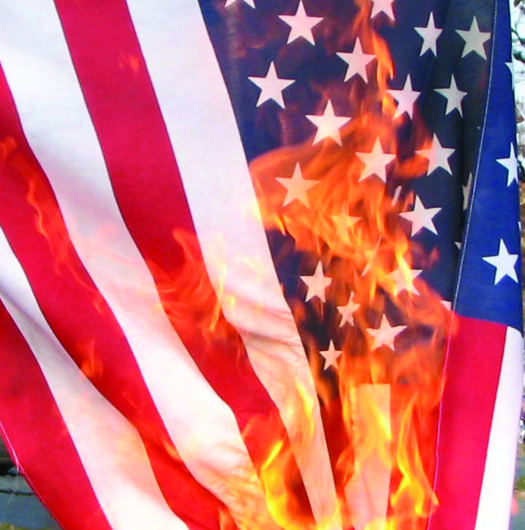| << Chapter < Page | Chapter >> Page > |
In the 1960s, however, the Supreme Court’s rulings on free expression became more liberal, in response to the Vietnam War and the growing antiwar movement. In a 1969 case involving the Ku Klux Klan,
Brandenburg v. Ohio , the Supreme Court found that only speech or writing that constituted a direct call or plan to imminent lawless action, an illegal act in the immediate future, could be suppressed; the mere advocacy of a hypothetical revolution was not enough.
Perhaps no act of symbolic speech has been as controversial in U.S. history as the burning of the flag ( [link] ). Citizens tend to revere the flag as a unifying symbol of the country in much the same way most people in Britain would treat the reigning queen (or king). States and the federal government have long had laws protecting the flag from being desecrated—defaced, damaged, or otherwise treated with disrespect. Perhaps in part because of these laws, people who have wanted to drive home a point in opposition to U.S. government policies have found desecrating the flag a useful way to gain public and press attention to their cause.

One such person was Gregory Lee
Johnson , a member of various pro-communist and antiwar groups. In 1984, as part of a protest near the Republican National Convention in Dallas, Texas, Johnson set fire to a U.S. flag that another protestor had torn from a flagpole. He was arrested, charged with “desecration of a venerated object” (among other offenses), and eventually convicted of that offense. However, in 1989, the Supreme Court decided in
Texas v. Johnson that burning the flag was a form of symbolic speech protected by the First Amendment and found the law, as applied to flag desecration, to be unconstitutional.
This court decision was strongly criticized, and Congress responded by passing a federal law, the
Flag Protection Act , intended to overrule it; the act, too, was struck down as unconstitutional in 1990.
Should we amend the Constitution to allow Congress or the states to pass laws protecting the U.S. flag from desecration? Should we protect other symbols as well? Why or why not?
Freedom of the press is an important component of the right to free expression as well. In
Near v. Minnesota , an early case regarding press freedoms, the Supreme Court ruled that the government generally could not engage in
prior restraint ; that is, states and the federal government could not in advance prohibit someone from publishing something without a very compelling reason.

Notification Switch
Would you like to follow the 'American government' conversation and receive update notifications?